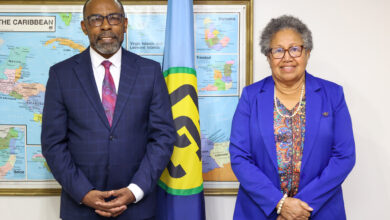(CARICOM Secretariat, Turkeyen, Greater Georgetown, Guyana) Representatives of the regional media industry meeting at a conference to accelerate their role in reducing HIV and AIDS-related stigma and discrimination identified a number of challenges to their optimal involvement in the Region’s response to the epidemic.
Among the challenges identified were the lack of research on HIV and AIDS coverage, including content, programming and media effects. Inadequate human resource capacity and use and understanding of new media technologies in the design of media programmes were also listed among the challenges.
The two and a half day conference titled Champions for Change III: Conference to accelerate the role of the media in reducing stigma and discrimination was organised into three segments: A Technical Meeting, a Forum and a Town Hall Meeting.
Three main issues that emerged from the presentations and discussions of the Technical Meeting were mainstreaming HIV and AIDS media coverage, enhancing HIV and AIDS media and communication programmes through increased use of ICTs, and capitalising on the lessons learnt from media best practices.
These formed the basis for the development of a draft action plan by the Technical meeting which was later refined by the wider forum. The Action Plan put forward a number of recommendations and identified specific activities to achieve these. A small committee comprising representatives of a number of PANCAP partners, the regional media association and the PANCAP Coordinating Unit was identified to advance the agenda for implementing the Action Plan.
The Conference, which was chaired by Dr. Edward Greene, Assistant Secretary-General, Human and Social Development, CARICOM Secretariat, included representatives from the media industry, regional faith-based organisations and a number of PANCAP partners.
Champions for Change is a DFID/CARICOM/PANCAP Initiative which seeks to address the issue of stigma and discrimination through key advocates who are leaders in their communities and willing to be forerunners in the effort to change attitudes. The first conference in St. Kitts and Nevis in 2004 brought together a wide cross-section of representatives from government, private sector, and civil society, cultural and sporting icons among others, to develop strategies and to forge partnerships for an effective response.
The Plan of Action of that first conference recommended more focused interaction with specific sectors of society. In this context, in 2005 a conference was held for regional faith-based organisations and a programme of work is currently being implemented.
DFID has indicated that it would support a Unit on HIV/AIDS stigma and discrimination to assist in implementing the recommendations from the Champions for Change process.




